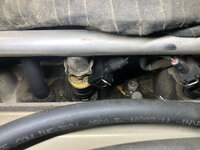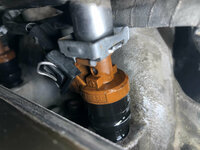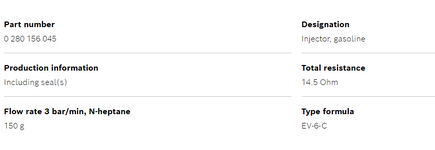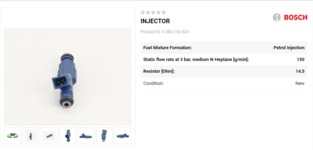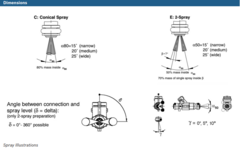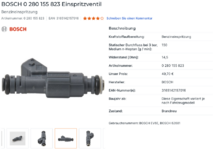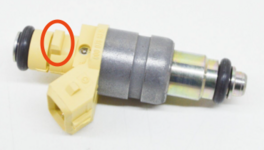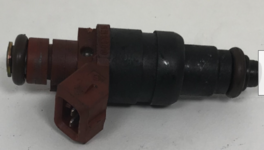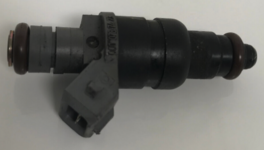A few months ago, I noticed a faint gasoline odor from inside the passenger compartment while driving. It was only for the first 5-10 minutes after a cold start. When arriving at my destination (total ~20 mins driving), the smell was gone, and popping the hood sniffing around there was no smell, no leak, nothing. Hmmm, that's odd. This happened a few times but I couldn't find any leak. Then in late November, I was moving that car out of the garage and into the shop, so it sat idling for a few minutes after a cold start. This time, I didn't smell gas, but there was a visible trail of liquid drops from where the car was parked idling, into the shop. Yup, it was gasoline.
I had replaced the FPR (regulator, not relay) a few months prior and suspected something went awry there. Pulled the airbox to look, and nope, the FPR was dry. But there was a puddle of gas below 2-3 different injectors! Raw gas was welling up in the intake manifold cavity until it flooded backwards, draining onto the top of the transmission bellhousing, and drip-drip-dripping on the ground below. Never seen anything like this.
So, I assumed (wrongly) that it must be the O-rings where the injectors plug into the fuel rail, because injectors never leak, right? Pulled the injectors, the old O-rings looked fine, but I replaced them anyway. Reassembled everything, fired it up, and it was leaking as bad as before!
This time I looked closer and it appeared the leak was not from the O-ring to the fuel rail, but rather from the body of the injector itself, where the plastic portion meets the round metal body. I thought this was a crazy fluke, as I've never heard of this happening to anyone else on an M119, ever. I had a set of used injectors that I pulled from a junkyard car 10 years earlier, so I installed those. I've heard of injectors "dying" in long term storage, I assume from the internals getting gummed up, so I wasn't sure if they would function. Thankfully, the engine ran smoothly on all 8 cylinders as soon as it fired, phew. But... another 2-3 injectors were leaking in the same way, at the body of the injector!! WTH!!!
Now, since injectors from the dealer are ~$1000/set and remans are about $350/set or so, and I was trying to get this car running without waiting a week (or spending $350+)... I pulled a third set from an engine that I had in the shop. This particular engine was running flawlessly when removed, so I knew the injectors were good... ten years ago. Third time was the charm, sort of. When the engine started, 2-3 cylinders were not firing properly, and it was running very rough. But no leaks! After about 5 minutes of idling, it gradually smoothed out. Went for a test drive, power was normal, idle was smooth, no visible leaks. Success, I hope. The car is in winter storage now and won't be daily driven again until spring, probably late April or early May.
This is really depressing stuff. This is a car driven several times per month, not a car that was in long-term storage. And, it was only fed zero-ethanol Top Tier premium gas. The initial leak was bad enough to flood the cavities below the injectors, and have raw gas run out the rear of the engine, dripping onto the floor. It was not a tiny leak.
It seems like GB Remanufacturing is the only game in town for buying exchange remans. I hope they actually disassemble injectors and replace the internal O-rings, not just clean/test them.
UPDATE: None of the injector "rebuilders" disassemble these Bosch EV1 injectors. If it leaks from the body as seen here, they are considered "broken" and not fixable. Injectors which are leaking from the body are either junk, or can be sent in as cores if buying "exchange" remans from FCP/RME/AHAZ or similar vendors.
All the "rebuilders" do is an ultrasonic cleaning service, along with a new filter, pintle cap, and O-rings. Pricing varies from $18 to $35 per injector depending on the shop. Injectors cannot be "balanced" or adjusted in any way. When clean and functioning as new, all 8 are expected to be within factory spec and have similar flow. If one or more injectors from a set is out of spec, the only option is to get additional injectors of the same part number - then flow test, and mix & match to create a set of 8 with similar / in-spec measurements.
I need to ask the dealership if new are still available, as shown by MB Classic (currently $1,200 per set of 8), or if they only have remans (-80 suffix) available for the same price. Aftermarket Bosch are NLA. In the meantime, guess I should be snagging more junkyard sets, as I'd rather not plunk down $300-$400/set for remans for the daily drivers / beaters, nor $1k+ for new injectors if available.
EDIT: Another game in town is RC Fuel Injection (thanks, Jono!)
 www.rcfuelinjection.com
www.rcfuelinjection.com
Photos and videocoming soon... posted below:

I had replaced the FPR (regulator, not relay) a few months prior and suspected something went awry there. Pulled the airbox to look, and nope, the FPR was dry. But there was a puddle of gas below 2-3 different injectors! Raw gas was welling up in the intake manifold cavity until it flooded backwards, draining onto the top of the transmission bellhousing, and drip-drip-dripping on the ground below. Never seen anything like this.
So, I assumed (wrongly) that it must be the O-rings where the injectors plug into the fuel rail, because injectors never leak, right? Pulled the injectors, the old O-rings looked fine, but I replaced them anyway. Reassembled everything, fired it up, and it was leaking as bad as before!
This time I looked closer and it appeared the leak was not from the O-ring to the fuel rail, but rather from the body of the injector itself, where the plastic portion meets the round metal body. I thought this was a crazy fluke, as I've never heard of this happening to anyone else on an M119, ever. I had a set of used injectors that I pulled from a junkyard car 10 years earlier, so I installed those. I've heard of injectors "dying" in long term storage, I assume from the internals getting gummed up, so I wasn't sure if they would function. Thankfully, the engine ran smoothly on all 8 cylinders as soon as it fired, phew. But... another 2-3 injectors were leaking in the same way, at the body of the injector!! WTH!!!
Now, since injectors from the dealer are ~$1000/set and remans are about $350/set or so, and I was trying to get this car running without waiting a week (or spending $350+)... I pulled a third set from an engine that I had in the shop. This particular engine was running flawlessly when removed, so I knew the injectors were good... ten years ago. Third time was the charm, sort of. When the engine started, 2-3 cylinders were not firing properly, and it was running very rough. But no leaks! After about 5 minutes of idling, it gradually smoothed out. Went for a test drive, power was normal, idle was smooth, no visible leaks. Success, I hope. The car is in winter storage now and won't be daily driven again until spring, probably late April or early May.
This is really depressing stuff. This is a car driven several times per month, not a car that was in long-term storage. And, it was only fed zero-ethanol Top Tier premium gas. The initial leak was bad enough to flood the cavities below the injectors, and have raw gas run out the rear of the engine, dripping onto the floor. It was not a tiny leak.
It seems like GB Remanufacturing is the only game in town for buying exchange remans. I hope they actually disassemble injectors and replace the internal O-rings, not just clean/test them.
UPDATE: None of the injector "rebuilders" disassemble these Bosch EV1 injectors. If it leaks from the body as seen here, they are considered "broken" and not fixable. Injectors which are leaking from the body are either junk, or can be sent in as cores if buying "exchange" remans from FCP/RME/AHAZ or similar vendors.
All the "rebuilders" do is an ultrasonic cleaning service, along with a new filter, pintle cap, and O-rings. Pricing varies from $18 to $35 per injector depending on the shop. Injectors cannot be "balanced" or adjusted in any way. When clean and functioning as new, all 8 are expected to be within factory spec and have similar flow. If one or more injectors from a set is out of spec, the only option is to get additional injectors of the same part number - then flow test, and mix & match to create a set of 8 with similar / in-spec measurements.
I need to ask the dealership if new are still available, as shown by MB Classic (currently $1,200 per set of 8), or if they only have remans (-80 suffix) available for the same price. Aftermarket Bosch are NLA. In the meantime, guess I should be snagging more junkyard sets, as I'd rather not plunk down $300-$400/set for remans for the daily drivers / beaters, nor $1k+ for new injectors if available.
EDIT: Another game in town is RC Fuel Injection (thanks, Jono!)
RC Fuel Injection
Photos and video

Last edited:

